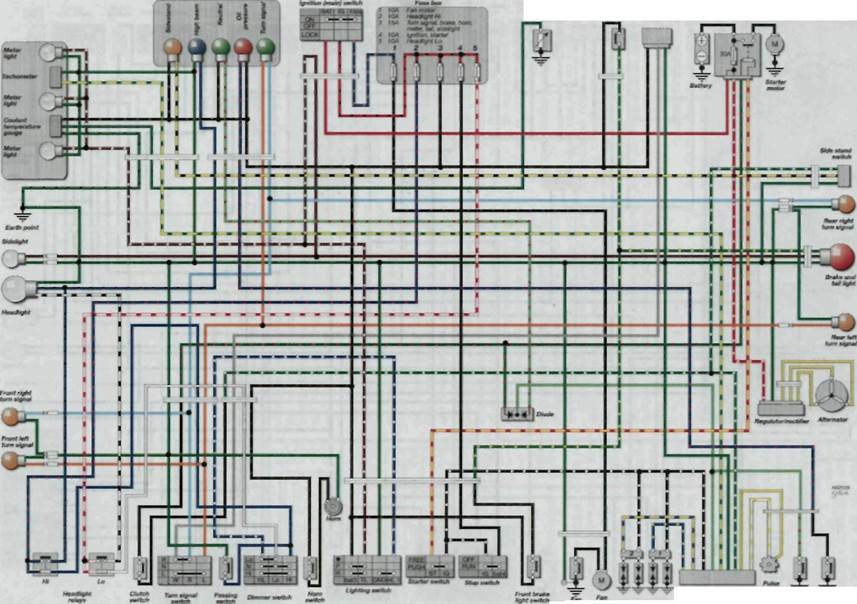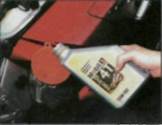
CATEGORIES:
BiologyChemistryConstructionCultureEcologyEconomyElectronicsFinanceGeographyHistoryInformaticsLawMathematicsMechanicsMedicineOtherPedagogyPhilosophyPhysicsPolicyPsychologySociologySportTourism
Test connections and data
Sanwa tester - K-ohms range
Kowa tester- 100 ohms range
°° - infinite resistance (no continuity)
Electrical system 9»23


| Coolant SS^fSS, rtimUgnml temperature "ff"' switch ^^y pondP' |
| - . mnt-r ignmon cons |

CB500R German market model
| T, V. W, X and Y modals |
 Ignition (main) switch
Ignition (main) switch
Fan JZL, Ignition coils SMtch motor ^^^p^
Coolant Rear brake Tumtttftal
tamparatura tight swHch ^ay
sonder
Puts* ganarmtor"ST
OO0
Neutral switch
CB500 T, V, W, SW, X, SX, Y, SY models
REF»1
Reference
Tools and Workshop Tips
REF«2
MOT Test Checks
REF-27


|

|
Building up a tool kit and equipping your workshop Using tools
Understanding bearing, seal, fastener and chain sizes and markings
Repair techniques
A guide to the UK MOT test Which items are tested How to prepare your motorcycle for the test and perform a pre-test check


|

|
Security
REF-20
Locks and chains
U-locks Disc locks
Alarms and immobilisers
Security marking systems Tips on how to prevent bike theft
Storage
REF-32
How to prepare your motorcycle for going into storage and protect essential systems How to get the motorcycle back on the road
Lubricants and fluids

REF-23
Engine oils
Transmission (gear) oils
Coolant/anti-freeze
Fork oils and suspension fluids Brake/clutch fluids
Spray lubes, degreasers and solvents
| Fault Finding | ■------ 77-------- VI |
| A | |
| w kIIS^H | |
| Mj. J ^H |
REF-35
Common faults and their likely causes How to check engine cylinder compression How to make electrical tests and use test meters

 Technical Terms Explained
Technical Terms Explained
REF«49

|
Conversion Factors
2>4- Nw* x 0.738
REF*26
Formulae for conversion of the metric (SI) units used throughout the manual into Imperial measures
Index
Component names, technical terms and common abbreviations explained
REF-53
REF-2 Tools and Workshop Tips
Buying tools
A toolKit is a fundamental requirement for servicing and repairing a motorcycle. Although there will be an initial expense in building up enough tools for servicing, this will soon be offset by the savings made by doing the job yourself. As experience and confidence grow, additional tools can be added to enable the repair and overhaul of the motorcycle. Many of the specialist tools are expensive and not often used so it may be preferable to hire them, or for a group of friends or motorcycle club to join in the purchase.
As a rule, it is better to buy more expensive, good quality tools. Cheaper tools are likely to wear out faster and need to be renewed more often, nullifying the original saving.
| A |
Warning: To avoid the risk of a poor quality tool breaking in use, causing injury or damage to the component being worked on, always aim to purchase tools which meet the relevant national safety standards.
The following lists of tools do not represent the manufacturer's service tools, but serve as a guide to help the owner decide which tools are needed for this level of work. In addition, items such as an electric drill, hacksaw, files, soldering iron and a workbench equipped with a vice, may be needed. Although not classed as tools, a selection of bolts, screws, nuts, washers and pieces of tubing always come in useful.
For more information about tools, refer to the Haynes Motorcycle Workshop Practice TechBook (Bk. No. 3470).
Manufacturer's service tools
Inevitably certain tasks require the use of a service tool. Where possible an alternative tool or method of approach is recommended, but sometimes there Is no option if personal injury or damage to the component is to be avoided. Where required, service tools are referred to in the relevant procedure.
Service tools can usually only be purchased from a motorcycle dealer and are identified by a part number. Some of the commonly-used tools, such as rotor pullers, are available in aftermarket form from mail-order motorcycle tool and accessory suppliers.
Date: 2016-01-14; view: 866
| <== previous page | | | next page ==> |
| B ... then align the rotor with the key and install it on the shaft | | | Maintenance and minor repair tools |